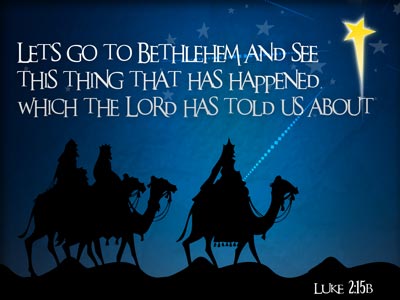-
Bethlehem, O Bethlehem
Contributed by Richard Futrell on Nov 28, 2017 (message contributor)
Summary: Nothing can take Christ’s promises away from you, for He was born in the town of Bethlehem to make it so. And no one can take you away from Him, for He seals that promise in His death and His blood.
Intro
Bethlehem, O Bethlehem of old, how small you are. You are small, so insignificant, that few even count you among the towns of Judah. So small and little-known are you that Micah the Prophet must call you Bethlehem of Ephratah, or someone might mistake you for another: Bethlehem of Zebulon.
Yes, O Bethlehem of Ephratah, so small are you that even ancient maps have forgotten you, not placing you on the yellowed parchment of old. What good can come from you O forgotten, little one?
The year is 735 B.C. The prophet Micah stands forth to speak; a strong voice and convicting air confronts the eardrums of all within earshot. Every eye stops, gazing on God’s prophet. Micah continues, “This day, let it be known to you what the LORD God has made known.” The assembly is stirring, eager for what Micah will next say. “Hear O Israel, the God of Abraham, Isaac, and Jacob: ‘The promised Messiah will be born in the little town of Bethlehem of Ephratah.’”
Disbelieving cries pierce the air. One calls out: “Are you even a prophet? How can the Promised One, our Messiah, be born there? Jerusalem, yes; Bethlehem, no! Surely there are greater places in Judah than Bethlehem, Ephratah.” And with a resounding voice the people agree. But Micah stands fast: “Doubt not the living and active Word of Yahweh; so will it be as I have said.”
Main Body
So the Savior Micah foretold would come from a small and little place. He would come from an insignificant clan of people, but His royal lineage would reach back beyond the beginning of time. For the One to be born in Bethlehem would be God Himself.
250 years before Micah, a ruler had come out of Bethlehem: King David. Yet the ruler whom Micah foretold would be of a different stripe. This Ruler would be “from old, from the days of eternity.” Micah spoke of One who is eternal--and only One is eternal: the Lord, our God. The Lord would then be born in Bethlehem.
So also spoke the angel Gabriel to the young Virgin: “The Holy Spirit will descend on you, and the power of the Most High will overshadow you. So the holy One to be born will be called the Son of God” (Luke 1:35). Look to the little town of Bethlehem and marvel at our Savior’s birth. It is in the humble town of Bethlehem that God came dwelling among us sinful creatures.
Jesus came wrapped in human flesh, wearing the robe of human frame, not looking as we thought a god should look. Yet, it was as Micah had foretold: “That is why He will give them [up] until she who is in labor has given birth.” And so Jesus was born of the Virgin Mary.
Look to the little town of Bethlehem to marvel at your Savior’s birth. The God who grants the power of speech must learn to talk. The God who enables the lion to run and the deer to leap must to learn to walk. The hands that molded and shaped the universe would reach out as a helpless Child. He grew up--as other children--but was without sin. We confess the truth of this reality in the Nicene Creed with these words: “and was made man.”
Even the meaning of the name Bethlehem tells us something about this place where God’s Son was to be born. Bethlehem means “house of bread.” In Israel’s early history, Bethlehem was where much grain grew in the fields, grain used for the making of bread. And “house of bread” is a fitting description. Wheat and barley clothed its fertile valleys, grains that were harvested, ground, and baked into loaves to eat.
But we do not live by bread alone. So in the fullness of time, One was born in this “house of bread,” One who is the Bread of Life. We don’t know the origin of the name “Bethlehem,” but it was where the Bread of Life was born to feed the souls of many. It is also called Ephratah, meaning “fruitful field.” Now it is bearing fruit such as they never dreamed, those who named the small, ancient town of old.
But the name “Bethlehem Ephratah” also tells us more. It was where common folk lived and worked. Although the town had one famous person--King David--it was still where farmers labored growing grain. And that tells us something about our Savior. He didn’t come to us in a palace of kings!
Jesus lowered Himself to our level. No one is so low for whom He did not descend. He was born in a stable and laid to sleep in an animal-feeding trough. He was born in Bethlehem, not in Jerusalem.
And so our Savior comes as a man, not as an angel. Jesus comes to live as a real human being in the waste and welter of His fallen creation. He takes on our human nature in every way--except sin. He comes to save common folk, like the people who live in Kimberling City.

 Sermon Central
Sermon Central



